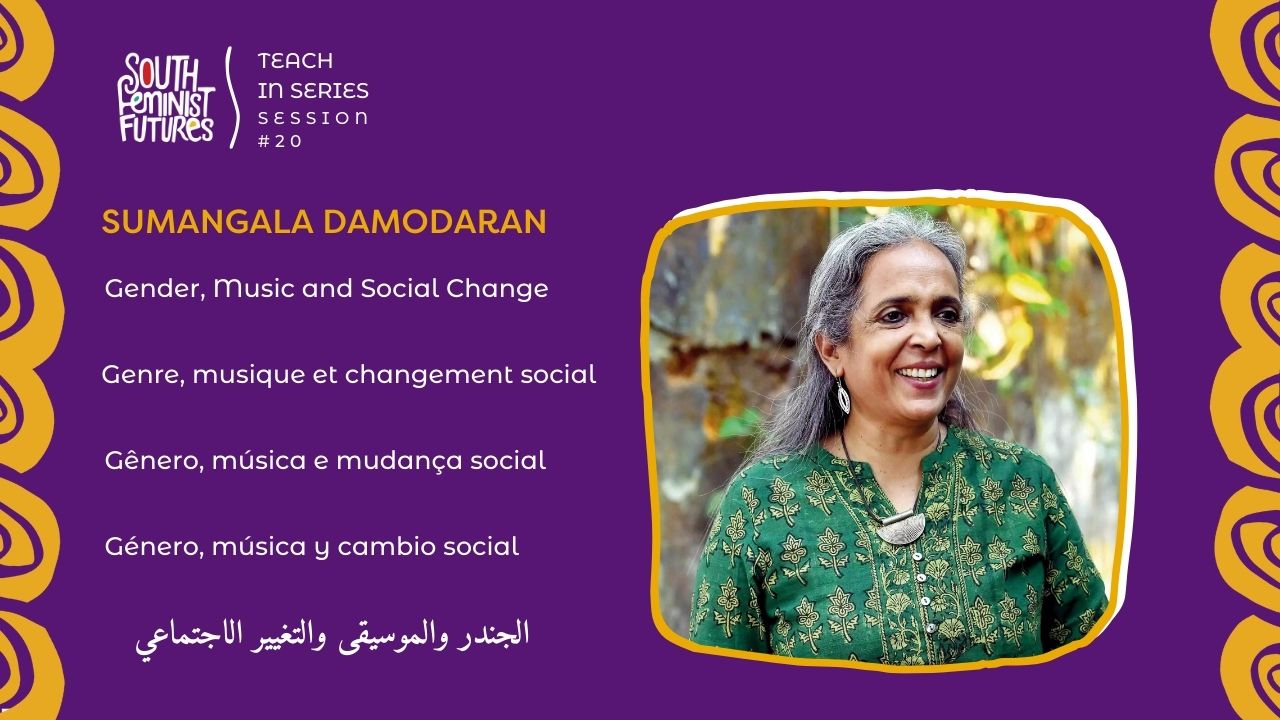We are pleased to have hosted the 20th session of our Political Economy Teach-In Series, “Gender, Music, and Social Change – Unravelling the Interconnections and Implications”, on 27 February with Sumangala Damodaran.
Thank you to everyone who joined us in this powerful conversation on the intersections of music, gender, and resistance! Stay tuned for more sessions.
Sumangala Damodaran is an economist and a scholar of popular music studies. She has archived the musical compositions of Indiaʼs anti-colonial and working-class music from a tradition known as the Indian Peopleʼs Theatre Association, which resulted in the book The Radical Impulse (2017) and an album titled Songs of Protest. Apart from her academic involvements, she is also a singer and composer. She has worked on precolonial AfroAsian connections using music as a lens, in collaboration with scholars and musicians from South Africa, Ethiopia, Zanzibar and China, producing several musical productions and two books.
The session explored the relationship between music and society and uncover gender in and through various kinds of music. The emphasis was on music and musicians from the Global South, particularly in cultures where music is passed down orally and aurally rather than in written form. Through a perusal of issues that have animated the production of various kinds of music and also using examples of where they have arisen from social movements and mobilisation of different sorts, the session illustrated how music can serve as a lens for understanding society and societal change.
All our sessions are recorded and you can access the previous ones on our website. The videos are in the original version, though we will be working to provide translated transcripts in Arabic, English, French, Spanish, and Portuguese to reach a wider audience.
Reading List
Explore below a curated selection of resources authored by Global South feminists. For a more comprehensive collection on this and other feminist topics, visit the South Feminist Knowledge Hub.
We welcome your contributions! If you know of other resources that should be included in this reading list, please submit them via this form or email us at knowledgehub@southfeministfutures.org.
English
The Radical Impulse: Music in the Tradition of the Indian People’s Theatre Association – Hardcover
Through this music album you will be immersed in the songs of protest composed between the 1940s and the 1950s by the Indian People’s Theatre Association and other organizations. All songs are performed by Sumangala Damodaran in four languages – Hindi, Bengali, Punjabi and Malayalam.
Prof. Damodaran gave examples of how music has been used to articulate resistance during the struggle for freedom from colonial subjugation and how later, after independence, the tradition has continued in different parts of the country. She performed popular songs from the 1940s to the present that have voiced resistance to the existing social and political order.
Development, Transformations and the Human Condition: Essays in Honour of Jayati Ghosh
This book looks at concepts that form the core of development economics and political economy and brings together perspectives that explore the inextricable relationship between development and human rights, social movements and the call for social transformation.
Introduction: Situating the Rural in Musical Imaginaries of Nation, Region, and Identity
This paper explores the role of music in shaping national and regional identities in rural contexts, particularly through the lens of historical events such as the Tebhaga peasant rebellion in Bengal. It examines how songs produced during significant agrarian movements, like those by the Indian People’s Theatre Association (IPTA), serve as vehicles for political expression and cultural critique.
Dharohar’22 Lecture by Prof. Sumangala Damodaran
Maps of Sorrow: Migration and Music in the Construction of Pre-Colonial AfroAsia
The Revolution Is a Song! , Karsten Noko
“In their contributions to local African resistance, musicians today such as Uganda’s Bobi Wine, who face increasingly autocratic governments, draw from the legacies of older artists such as Fela Kuti, Hugh Masekela and Miriam Makeba.“
Miriam Makeba, A Voice for African Women’s Struggles, Capire Mov
Freedom Songs: the role of music in the anti-apartheid struggle
Shatta music, a new space for French West Indian feminism, Coraline Kandassamy
Arabic
Cheikha Kharboucha: The Aita poetry as a weapon against tyranny, Sheikha Khartousha
Palestinian Music Blending Levantine Sounds and the Power of Poetry, Suheil al-Khoury
From you and in you: Towards an atypical heritage, Moussa Saleh
French
Miriam Makeba, A Voice for African Women’s Struggles, Capire Mov
Portuguese
From the bush to the stage: nation building in Mozambique through music, Sara Morais
Angola: musicality, politics and anti-colonialism (1950 – 1980), Amanda Palomo Alves
Spanish
The song is The Remedy: feminist and Latin American protest music, Katia Rejon
Magazine Catalogue #8: FEMINISMS AND ARTS, Collective Catalogue
BLACK VOICES. AN ORAL HISTORY OF AFRICAN POPULAR MUSIC, Tania Safura Adam
Songs and Audiovisual
Music playlist collaboratively created by the speaker and participants during the session
Song Without Fear ft. El Palomar, Vivir Quintana, Latin America and The Caribbean
Miriam Makeba singing about colonisation, Africa
Jaag Musafir (Remastered) by Rohail Hyatt and Fareed Ayaz Qawwal, Asia
“Stand Up” – Official Lyric Video, Cynthia Erivo, Northern America
Collective performance The Theses ‘A rapist in your path’, Latin America and the Caribbean
Las Raras del Folclor – Spotify Playlist, Latin America and the Caribbean
2020 Carnival Manifesto, Las Raras del Folclor, Latin America and the Caribbean
Mercedes Sosa in New York concert 1974, Latin America and the Caribbean
Didn’t It Rain?” Live Video 1964, Sister Rosetta Tharpe, Northern America
